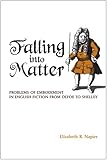Falling into Matter : Problems of Embodiment in English Fictions / Elizabeth R. Napier.
Material type: TextPublisher: Toronto : University of Toronto Press, [2011]Copyright date: ©2011Description: 1 online resource (304 p.)Content type:
TextPublisher: Toronto : University of Toronto Press, [2011]Copyright date: ©2011Description: 1 online resource (304 p.)Content type: - 9781442641983
- 9781442690196
- 823.5093561 23
- PR858.B63 N37 2012eb
- online - DeGruyter
| Item type | Current library | Call number | URL | Status | Notes | Barcode | |
|---|---|---|---|---|---|---|---|
 eBook
eBook
|
Biblioteca "Angelicum" Pont. Univ. S.Tommaso d'Aquino Nuvola online | online - DeGruyter (Browse shelf(Opens below)) | Online access | Not for loan (Accesso limitato) | Accesso per gli utenti autorizzati / Access for authorized users | (dgr)9781442690196 |
Frontmatter -- Contents -- Acknowledgments -- Introduction -- 1 Robinson Crusoe: Discord -- 2 Gulliver’s Travels: Shock -- 3 Clarissa: Grace -- 4 Tom Jones: Cohesion -- 5 A Simple Story: Dissipation -- 6 Frankenstein: Dissociation -- Epilogue -- Notes -- Works Cited -- Index
restricted access online access with authorization star
http://purl.org/coar/access_right/c_16ec
Falling into Matter examines the complex role of the body in the development of the English novel in the eighteenth century. Elizabeth R. Napier argues that despite an increasing emphasis on the need to present ideas in corporeal terms, early fiction writers continued to register spiritual and moral reservations about the centrality of the body to human and imaginative experience.Drawing on six works of early English fiction — Daniel Defoe's Robinson Crusoe, Jonathan Swift's Gulliver's Travels, Samuel Richardson's Clarissa, Henry Fielding's Tom Jones, Elizabeth Inchbald's A Simple Story, and Mary Shelley's Frankenstein - Napier examines how authors grappled with technical and philosophical issues of the body, questioning its capacity for moral action, its relationship to individual freedom and dignity, and its role in the creation of art. Falling into Matter charts the course of the early novel as its authors engaged formally, stylistically, and thematically with the increasingly insistent role of the body in the new genre.
Mode of access: Internet via World Wide Web.
In English.
Description based on online resource; title from PDF title page (publisher's Web site, viewed 01. Dez 2023)


